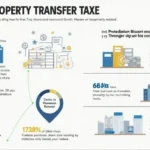NFT Real Estate Dispute Mediation: Navigating Challenges
With blockchain technology evolving rapidly, the fusion of NFTs and real estate has emerged as a significant trend. Yet, disputes in this innovative realm can be complex, requiring specialized mediation strategies. In 2024 alone, the Vietnamese NFT market witnessed a growth rate of 62%, reflecting the increasing interest in blockchain technologies, especially in real estate. How do we address conflicts that arise in this new sector?
The Rise of NFTs in Real Estate
Non-fungible tokens (NFTs) have revolutionized the way real estate is bought, sold, and owned. They provide a secure and transparent method for property transactions. However, as they become more prevalent, disputes are also expected to rise. Understanding the nuances of NFT real estate is crucial.
- NFTs serve as unique digital signatures for properties.
- Smart contracts automate transactions, ensuring transparency.
- The traditional real estate market faces challenges adapting to these changes.
Understanding Disputes
Disputes in NFT real estate often arise over ownership, valuation, and contractual obligations. Unlike conventional real estate transactions, where disputes can be settled through traditional legal frameworks, NFT real estate can require specific mediation techniques.

- Ownership disputes: Questions about rightful ownership can arise due to faulty smart contracts.
- Valuation challenges: Fluctuating market values of NFTs can lead to disagreements.
- Contractual disputes: Issues related to the execution of smart contracts may cause conflicts.
Mediation Strategies for NFT Real Estate Disputes
Effective mediation in NFT real estate must consider the unique aspects of blockchain technology. Here are some key strategies:
1. Understanding Blockchain Technology
Much like understanding the foundation of a building is essential for construction, comprehending blockchain technology is vital for mediators. This includes:
- How NFTs are minted and traded.
- The importance of verification through blockchain ledgers.
2. Tailoring Communication
Communication styles must adapt to the tech-savvy audience involved in NFT transactions. Using clear and straightforward language can bridge gaps and ease tensions.
3. Fostering Trust and Transparency
Building trust is imperative. Providing neutral platforms for both parties to review evidence and data can enhance transparency. It’s essential to ensure that both parties have equal access to information.
The Role of Local Context: Vietnam’s Growing NFT Market
Vietnam is increasingly embracing digital technologies. With a projected growth rate of 62% in the NFT market by 2024, understanding the local context provides valuable insights into mediation practices. The Vietnamese government is also beginning to establish regulations towards NFT transactions, which could further facilitate dispute resolution.
Local Regulations and Their Impact
As Vietnam navigates the complexities of NFTs, staying updated with regulations is crucial. The concept of “tiêu chuẩn an ninh blockchain” (blockchain security standards) is becoming a norm, ensuring that NFTs are safeguarded against fraud and manipulation.
Case Studies: Successful Mediation in NFT Disputes
Reviewing successful mediation cases provides insights that can shape future practices. Here are two notable instances:
- Case 1: A dispute over the sale of a virtual property was resolved through structured dialogue, where both parties presented their evidence on smart contract execution.
- Case 2: A valuation disagreement between two parties led to the appointment of an independent third party who assessed the NFT properties based on market data, facilitating a fair resolution.
Future Outlook: NFT Real Estate and Mediation
The future of NFT real estate appears promising, but challenges remain. As the market grows, so will the need for effective mediation strategies that are tailored to the unique aspects of this technology.
Anticipating Future Trends
By 2025, it is anticipated that blockchain technologies will not only evolve but also embed into the core operations of real estate. This evolution will require mediators to be at the forefront of educational initiatives to ensure they stay equipped with necessary knowledge. Trends to watch include:
- Integration of AI in mediating disputes.
- Increasing regulatory frameworks that provide support for NFT transactions.
Conclusion: Navigating NFT Real Estate Disputes
As we navigate the complexities of NFT real estate dispute mediation, it’s essential to embrace innovative strategies that respect the nuances of blockchain technology. With Vietnam’s growing NFT market and the increasing prevalence of disputes, having frameworks that ensure fair and effective mediation will only enhance the sector’s reputation.
In summary, the key takeaways for mediators in this space would be understanding blockchain thoroughly, maintaining clarity in communication, and fostering a transparent environment for dispute resolution. As the landscape continues to evolve, staying ahead of trends will contribute to successful mediation practices. Remember, in the world of NFTs and real estate, adaptability is paramount.
For further insights and updates, stay connected with officialcryptonews.
About the Author
Dr. Ethan Wright is a seasoned blockchain mediator with over 12 published papers on digital asset dispute resolution and has led audits for prominent blockchain projects globally.




